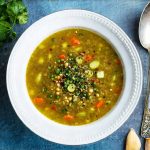Bone broth has experienced a surge in popularity in recent years, touted as a nutritional powerhouse with benefits ranging from improved gut health and joint support to enhanced immunity. This ancient food, traditionally made by simmering animal bones for extended periods, is rich in collagen, gelatin, minerals, and amino acids. Proponents often highlight its restorative properties and position it as a cornerstone of ancestral diets. However, while bone broth offers potential advantages, the narrative surrounding it frequently overlooks crucial considerations and isn’t universally applicable. The “superfood” label can sometimes overshadow the fact that bone broth is not a one-size-fits-all solution, and certain individuals may need to exercise caution or even avoid its consumption altogether.
The appeal of bone broth stems partly from a desire for simple, natural remedies in a world dominated by processed foods and complex health protocols. Its preparation—though time-consuming—feels intrinsically wholesome, connecting us back to traditional foodways. This resonates with many seeking more mindful approaches to nutrition. But beneath the surface of glowing testimonials and Instagrammable jars lies a nuanced reality. Factors such as ingredient sourcing, individual sensitivities, dietary restrictions, and potential contaminants all play significant roles in determining whether bone broth is truly beneficial or potentially detrimental for any given person. It’s essential to move beyond the hype and examine these complexities with a critical eye.
The Histamine Intolerance Factor
Histamines are naturally occurring compounds involved in numerous bodily functions, including immune response, digestion, and neurotransmission. Most people can effectively process histamines through an enzyme called diamine oxidase (DAO). However, some individuals experience histamine intolerance, meaning their DAO enzyme function is compromised, leading to a buildup of histamine in the body. This accumulation can trigger a wide range of symptoms, mimicking allergic reactions or other conditions. – Skin rashes and hives – Headaches and migraines – Digestive issues like bloating and diarrhea – Anxiety and mood swings
Bone broth, particularly if slow-cooked for extended periods, is inherently high in histamine. The simmering process actually increases histamine levels as proteins break down. For individuals with histamine intolerance, consuming bone broth can exacerbate symptoms significantly, leading to unpleasant and even debilitating reactions. This isn’t a reflection of the broth’s quality, but rather its inherent biochemical characteristics. Furthermore, certain bones—dark meat bones, for example—tend to yield higher histamine levels than others. People suspecting histamine intolerance should consider an elimination diet or work with a healthcare professional before incorporating bone broth into their routine. Even seemingly “low-histamine” versions may contain enough to trigger symptoms in sensitive individuals. It’s also important to note that conditions affecting gut health can often reduce DAO production, making individuals more susceptible to histamine intolerance over time. Understanding [why gut trouble in kids isn’t just a phase] is crucial for recognizing these underlying connections.
Lead Concerns and Sourcing Issues
The source of the bones used for broth plays a critical role in its safety and nutritional value. Animals accumulate heavy metals throughout their lives—lead being a significant concern—and these toxins can concentrate in the bones. Modern industrial farming practices, particularly those involving feed containing lead-contaminated minerals or water sources, exacerbate this issue. While healthy animals raised on organic pastures are less likely to have high levels of lead, it’s often difficult to ascertain the source and quality of bones purchased from commercial suppliers.
The concern isn’t simply about toxicity; even low-level chronic exposure to lead can have detrimental health effects over time. These include neurological problems, developmental issues (particularly in children), and cardiovascular risks. It’s a complex issue because testing bone broth for lead is not routinely performed by manufacturers. – Consumers relying on commercially produced bone broth should inquire about sourcing practices and potential lead testing protocols. – Ideally, bones should come from animals raised organically and grass-fed, minimizing their exposure to environmental toxins. – Homemade bone broth offers greater control over ingredient sourcing but still requires careful consideration of the animal’s origin. Prioritizing [smart meal planning for pancreas optimization] can also influence overall health.
Autoimmune Conditions and Gut Permeability
The relationship between bone broth, autoimmune conditions, and gut permeability is complex and often misrepresented. Bone broth’s collagen content is frequently promoted as a means to “heal leaky gut,” a term used to describe increased intestinal permeability. While it’s true that collagen can contribute to the structural integrity of the gut lining, simply consuming collagen doesn’t automatically resolve underlying issues causing permeability. In some cases—particularly in autoimmune conditions—increased gut permeability may be driven by inflammation and immune dysregulation.
Introducing bone broth without addressing these root causes could potentially worsen symptoms for individuals with certain autoimmune diseases. The amino acids in bone broth can sometimes stimulate the immune system, which might be counterproductive in autoimmune contexts where the immune system is already overactive. It’s crucial to remember that gut health is multifaceted and requires a holistic approach involving dietary adjustments, stress management, and targeted therapies as determined by a healthcare professional. Furthermore, some individuals with autoimmune conditions may have sensitivities to components commonly found in bone broth, such as glutamates or specific proteins. Taking [top lifestyle shifts for long-term enzyme support] can be helpful here too.
Kidney Disease Considerations
Individuals with kidney disease need to carefully monitor their intake of protein and certain minerals, including phosphorus and potassium. Bone broth, being derived from animal bones, is naturally rich in these substances. Excessive consumption can place a significant burden on compromised kidneys, potentially accelerating the progression of renal dysfunction. This isn’t to say that bone broth is entirely off-limits for people with kidney disease, but rather that it should be consumed cautiously and only under the guidance of a nephrologist or registered dietitian specializing in renal nutrition.
The amount of protein, phosphorus, and potassium varies depending on the type of bones used and the length of simmering time. – Individuals already following a restricted diet due to kidney disease should carefully evaluate their overall intake before adding bone broth. – Monitoring kidney function through regular blood tests is essential for anyone with renal impairment who chooses to incorporate bone broth into their diet. – Smaller portions and less frequent consumption may be necessary to minimize the risk of exacerbating kidney issues. Understanding [why enzyme deficiency is often misdiagnosed] can help refine dietary choices.
Medication Interactions & Purine Content
Bone broth contains purines, naturally occurring substances found in many foods. When broken down by the body, purines produce uric acid as a byproduct. For most people, the kidneys efficiently eliminate uric acid. However, individuals with gout—a type of arthritis caused by uric acid crystal deposits—or those taking certain medications that affect kidney function may experience an increase in uric acid levels after consuming purine-rich foods like bone broth. This can trigger painful gout flares.
Certain medications, particularly diuretics and some blood pressure medications, can also reduce the kidneys’ ability to excrete uric acid, further increasing the risk of a flare-up. Moreover, individuals taking immunosuppressants or other medications affecting immune function should exercise caution when consuming bone broth, as it may potentially interact with these drugs. It’s vital to discuss potential interactions with a healthcare provider before adding bone broth to one’s diet, especially if you have underlying health conditions or are taking any medications. Bone broth is not inherently harmful, but its impact can vary greatly depending on an individual’s specific circumstances and medical history. If gut issues are present, consider [why gut trouble in kids isn’t always about food]. Ultimately, the goal should be [building a life where digestion isn’t the main story], and informed choices are key to achieving that. A [stool test for occult blood] might also provide valuable insight.


















